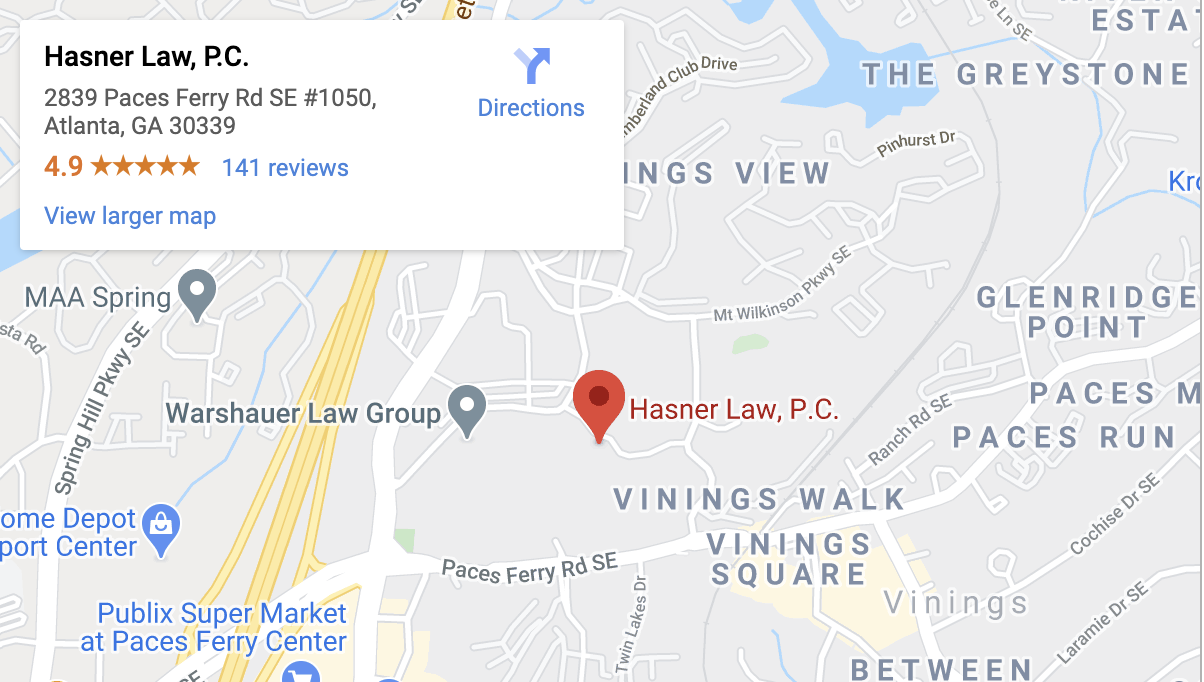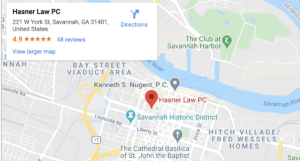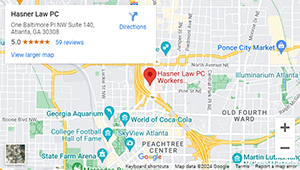How Does Car Insurance in Georgia Work?
Key Takeaways About Car Insurance in Georgia
- Coverage: Car insurance types in Georgia include liability, collision, comprehensive, medical payments, and uninsured/underinsured motorist protection.
- Claims Process: After an incident, you file a claim, and an insurance adjuster assesses the damage to determine the payout based on policy terms and deductibles.
- Policy Limits: Each coverage type has a limit, the maximum amount the insurer will pay per covered claim, excluding intentional damage and commercial use without proper coverage.
- Legal Representation: With over 80 years of combined experience, Hasner Law Injury & Workers’ Compensation Attorneys helps navigate insurance claims, working to recover fair compensation and hold insurers accountable.

You probably only think about car insurance when it is time to shop for a new policy. Even then, you likely focus on the price and not necessarily the coverage or how your policy works. However, it is essential to understand how your coverage works because the policy you buy will come into play after a car accident.
At Hasner Law Injury & Workers’ Compensation Attorneys, our injury attorneys understand dealing with the aftermath of a car accident is often overwhelming, especially when it comes to dealing with insurance claims. Our team of dedicated personal injury attorneys can help you make sense of your policy and help you recover the compensation you deserve. With over 100 years of combined experience, we are well-equipped to guide you through the process, fight for your rights, and hold insurance companies accountable.
Overview of How Car Insurance in Georgia Works
Car insurance is a contract between you and your insurance company designed to protect you financially in the event of an accident, theft, or other vehicle-related incidents. When you purchase a car insurance policy, you pay regular premiums to your insurance company. In return, the insurer agrees to cover certain costs associated with accidents or other covered events according to the terms of your policy.
Auto insurance policy coverage in Georgia may include:
- Liability
- Collision
- Comprehensive
- Medical payments
- Uninsured/underinsured motorist protection
After an accident or covered event, you file a claim with your insurance company. This involves providing details about the incident, such as when and where it happened, the extent of the damage, and any police reports. Your insurer will then investigate the claim to determine fault and the extent of coverage.
An insurance adjuster will assess the damage and determine how much the insurance company should pay for repairs, medical expenses, and other covered costs. If the claim is approved, the insurer will issue a settlement based on the policy terms, less any applicable deductibles.
Policy Limits
Each type of coverage in your car insurance policy has a limit, which is the maximum amount the insurer will pay for a covered claim. For example, if your liability coverage has a limit of $25,000 for bodily injury per person, your insurance will cover up to $25,000 for each person injured in an accident you cause.
It’s important to know what your policy does not cover. Common exclusions include intentional damage, using your vehicle for commercial purposes without the appropriate coverage, and driving under the influence.
Deductibles
Your deductible is the amount you agree to pay out of pocket before your insurance coverage kicks in. For instance, if you have a $500 deductible for collision coverage and incur $3,000 in damages from an accident, you will pay the first $500, and your insurance will cover the remaining $2,500.
Premium Factors
Several factors can affect your car insurance premiums in Georgia, including your driving record, age, type of vehicle, location, and credit history. Maintaining a clean driving record and good credit may lower your premiums.
What if You Were at Fault for the Accident?
If you are at fault in an accident, the other party involved can file a claim against your liability insurance. Your insurance company will handle these third-party claims, negotiate settlements, and pay out damages up to your policy limits.
Filing a claim can affect your future premiums, and if you are found to be at fault, your insurance rates will likely increase. However, some insurers offer accident forgiveness programs, which can prevent your premiums from rising after your first accident.
In some states, car insurance works under a “no-fault” system, where each driver’s insurance covers their own injuries and damages regardless of who is at fault. However, Georgia operates under an at-fault system, where the driver responsible for the accident is liable for covering damages.
Car Insurance Requirements and Laws in Georgia
If you are a Georgia driver, it is vital for you to understand the state’s specific requirements and regulations, as they can impact your coverage and claims process. Some fundamental aspects you should know about car insurance in Georgia include:
Minimum Liability Coverage
Georgia law requires all drivers to carry minimum liability insurance. This includes $25,000 per person for bodily injury, $50,000 per accident for bodily injury to multiple people, and $25,000 for property damage per accident.
This basic coverage helps pay for injuries and damages you may cause to others in an accident. However, these minimum limits may not be sufficient to cover all expenses in a serious accident, which is why many drivers opt for higher coverage limits or additional types of insurance.
At-Fault State
As stated above, Georgia operates under an “at-fault” system, meaning the driver who is determined to be at fault for an accident is responsible for the resulting damages. If you are found to be at fault, your liability insurance will cover the other party’s medical expenses and property damage up to your policy limits. This system also allows the injured party to pursue additional compensation directly from the at-fault driver if their damages exceed the limits of the driver’s insurance coverage.
In practice, this means the at-fault driver’s insurance company will investigate the accident to determine liability and settle claims accordingly. If multiple parties share fault, Georgia follows a comparative negligence rule, which reduces the amount of compensation based on each party’s degree of fault. For instance, if you are found to be 30% at fault for an accident, your compensation will be reduced by 30%.
Reporting Requirements
In Georgia, you are required to report any accident which results in injury, death, or property damage exceeding $500 to the local authorities. This means contacting the police to come to the scene and file an official report. The report will document important details about the accident, including the names and contact information of those involved, insurance information, and a description of the events leading up to the collision.
Failing to report an accident can result in legal consequences and may complicate the process of filing an insurance claim. Additionally, having an official police report can be crucial evidence if disputes arise regarding fault or damages. It is always advisable to cooperate fully with law enforcement and provide accurate information to ensure a comprehensive and factual report is filed.
Optional Auto Insurance Coverage in Georgia
In addition to the mandatory minimum liability coverage required by Georgia law, drivers have the option to purchase additional types of auto insurance coverage. These optional coverages can provide extra protection and financial security in various scenarios, helping to cover costs that basic liability insurance does not.
Uninsured/Underinsured Motorist Coverage (UM/UIM)
In theory, the auto insurance mandate means accident victims in every crash should have a source of injury compensation. Unfortunately, not everyone in Georgia carries valid auto insurance. In fact, over 18% of Georgia vehicle owners did not have car insurance in 2022, according to the Insurance Information Institute (III). Georgia ranked 7th highest in the country for their estimated percentage of uninsured motorists.
Uninsured/underinsured motorist coverage is highly recommended in Georgia, given the number of uninsured or inadequately insured drivers on the road. This coverage helps protect you if you’re involved in an accident with a driver who either has no insurance or insufficient insurance to cover your damages. It can pay for medical expenses, lost wages, and other costs related to the accident.
Comprehensive Coverage
Comprehensive coverage is designed to protect your vehicle from damage unrelated to collisions. This includes incidents such as theft, vandalism, natural disasters, falling objects, and animal strikes. Comprehensive coverage ensures you are financially protected from a wide range of potential hazards.
Collision Coverage
Collision coverage pays for the repair or replacement of your vehicle if it is damaged in an accident, regardless of who is at fault. This type of coverage is particularly valuable if you have a newer or more expensive vehicle, as it can help you avoid significant out-of-pocket costs after an accident.
Medical Payments Coverage (MedPay)
Medical Payments Coverage, or MedPay, covers medical expenses for you and your passengers after an accident, regardless of fault. This can include hospital bills, surgery costs, and even funeral expenses. MedPay can be a crucial addition to your insurance policy, providing immediate funds to cover medical costs while you wait for liability claims to be resolved.
Personal Injury Protection (PIP)
Although not mandatory in Georgia, Personal Injury Protection (PIP) is another valuable optional coverage. PIP covers medical expenses, lost wages, and other related costs if you or your passengers are injured in an accident, regardless of fault. This coverage can be particularly beneficial in ensuring timely payment for medical treatments and other essential services.
Rental Reimbursement Coverage
If your vehicle is in the shop for repairs after an accident, rental reimbursement coverage helps pay for the cost of renting a replacement vehicle. This coverage can help you avoid additional inconvenience and expenses while your car is being repaired.
Roadside Assistance
Roadside Assistance coverage provides help with common roadside emergencies such as flat tires, dead batteries, lockouts, and towing needs. Having this coverage can give you peace of mind, knowing that you will not be stranded without help in case of a breakdown.
Gap Insurance
Gap insurance is especially important if you have financed or leased your vehicle. In the event of a total loss, gap insurance covers the difference between the actual cash value of your vehicle and the remaining balance on your loan or lease. This ensures you are not left with a significant financial burden if your vehicle is totaled.
By considering these optional coverages, you can tailor your auto insurance policy to better meet your needs and provide comprehensive protection against a variety of risks. While these additional coverages might increase your premium, the added financial security and peace of mind they offer can be well worth the investment.
How to Get Compensation From a Car Insurance Claim
Under the fault-based system, you must generally prove negligence to get injury compensation.
When someone else’s actions cause your accident, you can recover compensation if you can prove:
- Duty
- Breach
- Damages
- Causation
Drivers have a legal duty to drive with reasonable care. They breach this duty by doing something unreasonably dangerous. In many cases, the at-fault driver received a traffic ticket for causing the crash.
When an at-fault driver breaks a traffic safety law, you can take advantage of a doctrine called “negligence per se.” Under this doctrine, the law presumes negligence when a driver’s violation of a traffic safety law causes a crash. However, you can still prove negligence even if the driver did not break a traffic safety law.
Suppose a distracted driver hits you while talking on their cell phone. If the driver was holding the handset, they broke Georgia’s hands-free law, and therefore, the driver was negligent per se. If they were using earbuds, they may still be negligent, but you must prove the distraction caused by the phone call was unreasonably dangerous.
Additionally, it must be proven that the breach of duty directly caused your injuries. Causation means the breach fell within the sequence of events that led to your accident. It also means the at-fault driver’s actions were the type that would foreseeably cause injuries.
Damages Recoverable From Car Insurance Claims in Georgia
You can recover both economic and non-economic damages. Economic damages cover all the financial costs you incurred due to your accident. These include:
- Past and future medical expenses
- Income losses
- Future diminished earning capacity
Non-economic damages cover all the ways your injuries affected your quality of life. These losses do not come with a price tag. But they nonetheless take a toll on you. Examples of non-economic losses include:
- Pain
- Suffering
- Disability
- Disfigurement
- Diminished enjoyment of life
Claim adjusters put a price tag on these losses based on the severity and duration of your injuries. If you suffer a permanent disability, such as paralysis or a brain injury, you will have greater economic losses than if you suffered an injury that eventually healed, like a broken bone.
Why Choose Hasner Law Injury & Workers’ Compensation Attorneys to Help After a Car Accident in Atlanta, Georgia?
Hasner Law Injury & Workers’ Compensation Attorneys was established by an experienced insurance defense attorney. With this insider knowledge of how the other side works, we have helped numerous clients recover maximum settlements for their damages, earning us hundreds of reviews from satisfied clients.
Our team of car accident attorneys has over eight decades of combined experience, helping us rank as one of the highest-rated car accident law firms in Atlanta. We are proud of our 5.0-star client reviews on:
- Avvo
- Martindale-Hubbell
Hiring us means we’ll have the ability to help with your car accident claim by:
- Fully assessing your damages and collecting evidence to prove your case
- Demanding compensation from the at-fault party and negotiating an adequate settlement
- Potentially filing a lawsuit on your behalf if needed
At Hasner Law Injury & Workers’ Compensation Attorneys, we prioritize personalized attention and compassionate support throughout the entire process. We understand the physical, emotional, and financial toll a car accident can take on you and your family. That’s why we are dedicated to providing you with clear communication, regular updates on your case, and unwavering advocacy every step of the way.
Schedule a Free Consultation with Our Atlanta Car Crash Attorney
Car insurance can provide valuable compensation after an accident, but you will need to fight the insurer for a fair settlement. Auto insurance companies’ interests are in their own pockets, so expect them to argue your claim using every tactic available to them.
To discuss your accident and how an experienced Atlanta car accident attorney on our team can help you and your family, contact the Hasner Law Injury & Workers’ Compensation Attorneys office to schedule your free consultation. Call (678) 888-4878 or complete our contact form to get started today.






